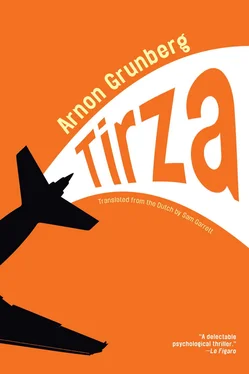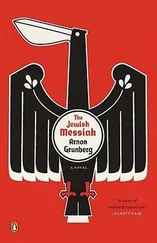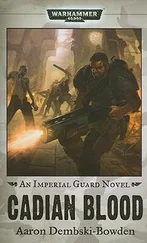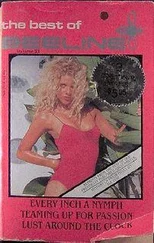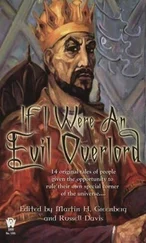The wine is on, but its cola not yet. He picks up its glass. 'MAG I?' he asks. He takes a few swallow. It tastes like it. But he has thirst.
'The story. Yes,' he says, 'the story of the family ship's steward is the destruction of the family ship's steward. That is the story. That is my story. A world without compassion is onvoorstelbaarder than the own death, therefore, we are still on the back, therefore it should be depends. I had in several places in my life have thought: I must back. This road is not mine, this road is not the best. But I did not go back. O certainly, Kaisa, sure…'
He is on, he will stand beside her, puts his hands on her head in her dress, that part of the back of the dress is not covered. 'There are choices,' he says, 'die are correct, there are choices that are bad, there are cases of doubt. As the highest form of compassion consists that you and the other in life, I can only confirm: I am a man without compassion. I lost my control, perhaps. But only when I lost my control, i was who i am. That portion of Jörgen ship's steward that outside the law is his hard core. That is why I am here. So here I am. Because I no longer need to have doubts about who i am.'
The child is running her face toward him. She looks at him. She is not afraid, why? She seems even to laugh. She smiles at the man who say things that they do not understand, words to which they probably do not agree to listen to me.
From the kitchen is music. The German-speaking transmitter of Namibia. Again.
Both listen to the radio them in the distance, without any can mean. And they smile.
And because they smiles, because they finally smiles, he says: 'Kaisa, there is a difference between forgiveness and acceptance? I forgive the world by its to accept. I accept everything. There is nothing I do not accept. And you? You saw me walk, on an afternoon in Windhoek, a hot afternoon. You saw a man who was difficult, because he had wounds to his feet. Of the heat. Shoes knelden. And you came back to me. I do not know why. Does it matter? You picked my hand, you went. We can grant meaning to. That it was supposed to be. It is not possible otherwise. That someone there is an intention to have. Perhaps it had to be, but perhaps not. What is important is that you are there. That we both outside the law. This is what it is all about.'
He bending, are looking for under the table, but he has this evening his bag not included. Forget the again and again. The bag is in the hut. Ship's steward does the child at hand. She finds its seat slide. He is 'Sir' and it is 'company'. That is their game. Now it takes all days.
In the dark, probably as a result of the wine road, he may no longer eleven to hut so easy to find. They walk through the high grass. Slowly. Kaisa cannot quickly, ship's steward can also not quickly. Not at this hour of the night. Not by the high grass. Not here in Namibia, with are still slightly swollen feet.
They run laps. Ship's steward notes, and he says: 'We walk rounds. Where is our hut, Kaisa?'
He takes the child on his shoulders. 'Where is our hut?' he asks. 'Where we live?'
Yet he is running slower now, afraid if he is to fall.
He carefully place the child back on the ground.
'Tirza,' he says, 'Tirza. Yes. The problem with Tirza was that they have high-high gifted was…. High-high gifted. The last few years I lived with her only.'
He is going to sit in the grass.
'Her sister was already to France, my wife was moved to her childhood love. I was only with Tirza and actually, in hindsight, it was the best time of my life. I cooked for her. I am not occupied herself too much more with her life. That I had done. But that was a mistake.'
He is. Something by the substance of the spiked his pants. After five minutes they have finally found eleven hut
Ship's steward does the fan. From his briefcase he retrieves Tirza's iPod. He let the engraving to the child. 'Solar Queen,' he says, 'is there. Sun Queen.'
He charges iPod on, stops the earphones of the device in the ears of the child.
'It is the music listening Tirza,' he says. 'It is her music.'
Ship's steward will sit on the bed while the child to Tirza's music. The fan is running and also knows no longer ship's steward for which he has travelled to Namibia. He remembers still limited. His own past seems a different life. Someone else has it lived, someone else was writer foreign fiction, someone else is on all those places, someone else wanted to abolish the love. He was always in Namibia, with Kaisa.
The next morning they drive in one flick through to Swakopmund, a coastal town. There are many tourist, more than elsewhere. Ordinary tourist also. With charter flights from Germany, for the Sun and the sea and a hint of Exotica. Not of those people who have something special with Africa. They have something special with the sun, they maintained an intimate relationship with their bikini.
Together with the child he moved into the small Eberwein Hotel, not far from the beach. We talk is fluent in German and also the device does very German.
Mrs Eberwein itself is behind the reception. Wrinkled and dried out by the sun but kwiek and even a tad aggressive. Mrs Eberwein here is the boss. Nobody will doubt. It is her hotel. She asks or ship's steward a cot. Here he declares that a large double bed is fine. 'We will not remain long,' he says. 'It is my niece.'
And because it cannot be, he would like the photo of Tirza on the counter. "Have you this girl here may have seen in the last couple of weeks?'
The Woman with White, probably painted, curly hair looking forward. She picks the photo even momentarily. 'No," she says, 'never seen. Who is it?'
My daughter,' says ship's steward, 'my youngest daughter.'
Mrs Eberwein brings the picture even closer to her eyes. 'It looks similar to you," she says. 'They did your chin.'
And then she looks to the girl that in addition to ship's steward. Like Mrs Eberwein the chin of the girl you wish to check.
Ship's steward runs with the child on the beach, tail with the child on the pier to fishing, shares a salad with her in café Out of Africa, and is, while they are in a merry, called by his wife.
He tells the wife almost everything about his travel, accommodation, Toyota, Swakopmund, except for the child.
'I am almost in the desert,' he says, 'I am almost at Tirza. It is still a day of riding.'
'Ibi,' says the wife, 'it is strange that it has heard nothing of Tirza.'
Her voice has still not the invigorating and hoarse sarcasm that he is so much of its usual. The schor that some men as defeats.
'Ibi should not always believe they are the most important.'
There is a silence in the conversation. The merry slows down. Kaisa climbs of her horse. Ship's steward lent its.
'And how do we?' he asks. 'How is it?'
The Van Eeghenstraat seems so far away. A different world. All not more to his.
'Well," she says, 'this is good. Jörgen, what I wanted to say yet, I have a phone call from the mother of Choukri had. Initially i had no idea who it was. They spoke French.'
Kaisa is now next to him. He directs that they still have a round with the merry-go-round mag. Have another round and another and another. He gives its money. But they are its main against his body. As if they were tired. As if they trust him.
Who knows they trust him. It is a matter of time, and need. Especially the last.
He knows no compassion, but he is to trust.
'Jörgen, aren't you?'
'Yes.'
'De mother of Choukri called. She asked where her son was. My French is not so good.'
'I thought he had no contact with his family. The boy.'
'Oh, well yes they sounded… they sounded likeable but worried.'
'You have yet been said that they sit in the desert? What do you think that people, that there in the desert to the ten meters a telephone box condition? They come from the desert.'
Читать дальше
